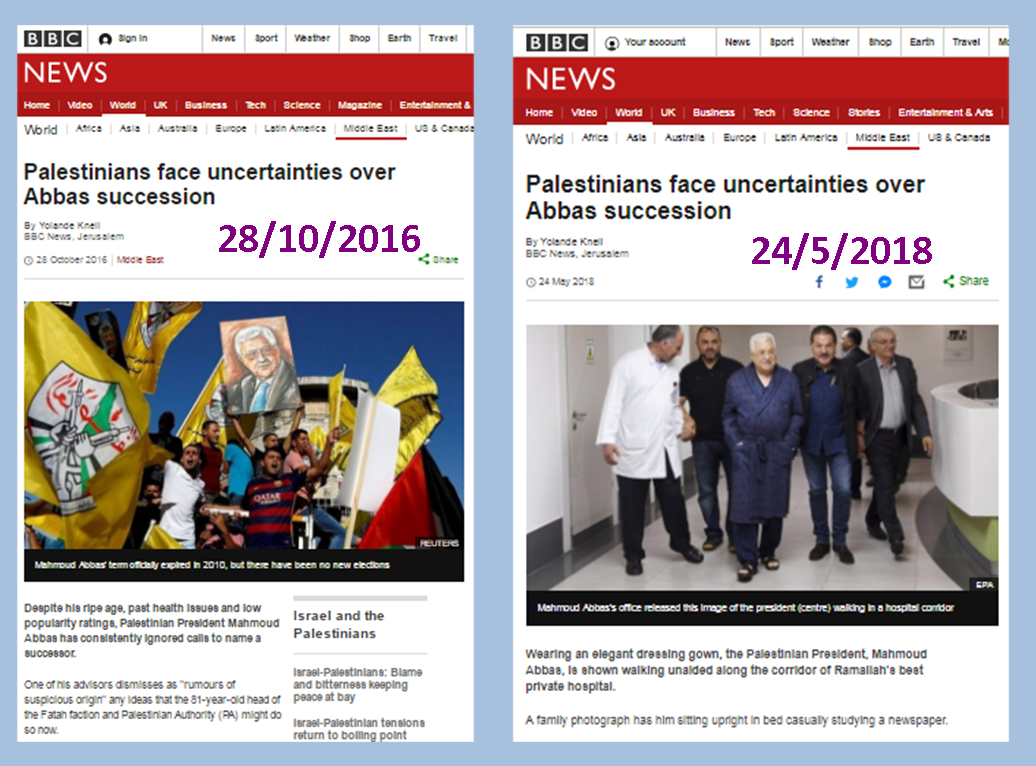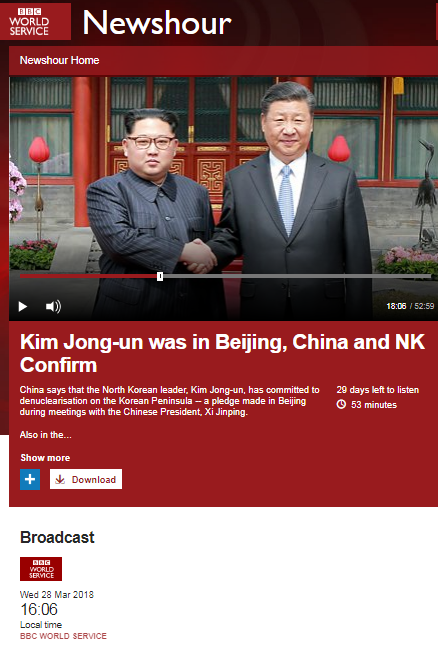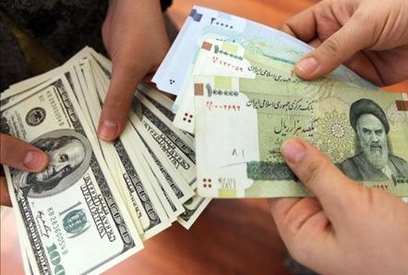January 22nd saw the appearance of a filmed report titled “Lebanon protesters angry over new government” on the BBC News website’s ‘Middle East’ page. The video’s synopsis reads:
“Protesters in Lebanon have returned to the streets, saying the new government formed on Tuesday does not meet their demands.
They had been calling for an overhaul of the political system, the formation of an independent, non-sectarian cabinet, and an end to government corruption.
The new cabinet was announced after months of deadlock. PM Hassan Diab said it would be a “rescue team” that would work to meet protesters’ demands.
But the demonstrators say the ministers were selected by the entrenched political elite that they blame for Lebanon’s problems.”
Produced by Rana Taha of BBC Monitoring, the video itself tells BBC audiences that: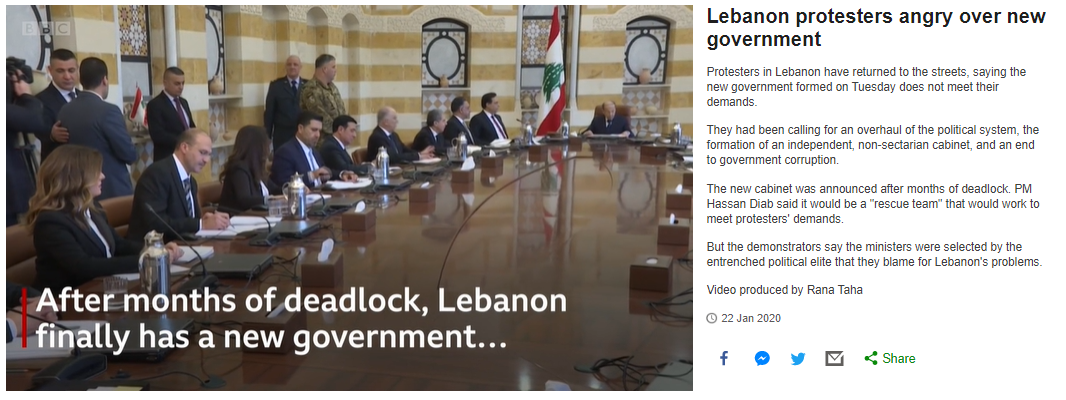
“After months of deadlock, Lebanon finally has a new government but it has not eased demonstrators’ anger. Protesters took to the streets after the new cabinet was announced. This led to confrontations with security forces. The protesters had wanted a government of technocrats to overhaul the political system. They say the new ministers are still backed by the old political forces.”
Rather than explaining that opaque last sentence, the video goes on with a weighty section focusing on a different topic.
“The new cabinet includes the Arab world’s first ever female defence minister. Zeina Akar is one of six women appointed to the cabinet.”
After showcasing assorted Tweets relating to that appointment, the video closes:
“The country has been without a government since October when PM Saad Hariri was forced out amid mass protests. He was replaced by Hassan Diab who says the new ministers are technocrats. Some are happy the government is in place. But others are questioning the ministers’ expertise.”
As we see, BBC Monitoring carefully avoided any mention of specific political factions in that superficial report, meaning that viewers were left none the wiser about how Lebanon’s new government came into being.
“The new government is the product of escalating popular protests under way since October 15. The protests are in response to Lebanon’s dire economic state. Demonstrators were demanding the formation of a government of ‘technocrats’ qualified to address the urgent issues facing the country and untainted by contact with Lebanon’s enormously corrupt political parties.
The new government appears to be an attempt to create the superficial appearance of such an administration. Its 20 ministers were presented by Prime Minister designate Hassan Diab as ‘specialists’, non-partisan and without loyalties to this or that political bloc.
Few Lebanese are likely to be convinced by this claim. The ‘specialists’ in question are individuals whose names were put forward by the political parties. The composition of the new government emerged in a process of wrangling and horse trading between these parties.
But crucially, parties and movements broadly associated with the west and with Saudi Arabia stayed out of the negotiations. Individuals linked to prominent pro-western and anti-Iranian political trends such as the former Prime Minister’s Mustaqbal (Future) Movement and the Christian Lebanese Forces are not to be found among the new ministers. The Progressive Socialist Party of Lebanese Druze leader Walid Jumblatt is also not represented.
The government that has emerged from this process comprises individuals linked to movements which are part of only one of the existing power structures – the one associated with Hizballah and Iran.
The new administration is being described by Lebanese commentators as a government of ‘one color,’ Lebanon’s first of this kind. The color is that of Hizballah and Iran’s banners.
Hizballah itself controls only two ministries in the new government. But the Christian Free Patriotic Movement led by Gebran Bassil, and the Shia Amal movement, both closely associated with Hizballah, control much of the rest. Smaller parties also associated with this bloc make up the remainder.”
So is the BBC really not aware of the background to the new Lebanese government? A written report also published on the BBC News website’s ‘Middle East’ page on January 22nd shows that is not the case.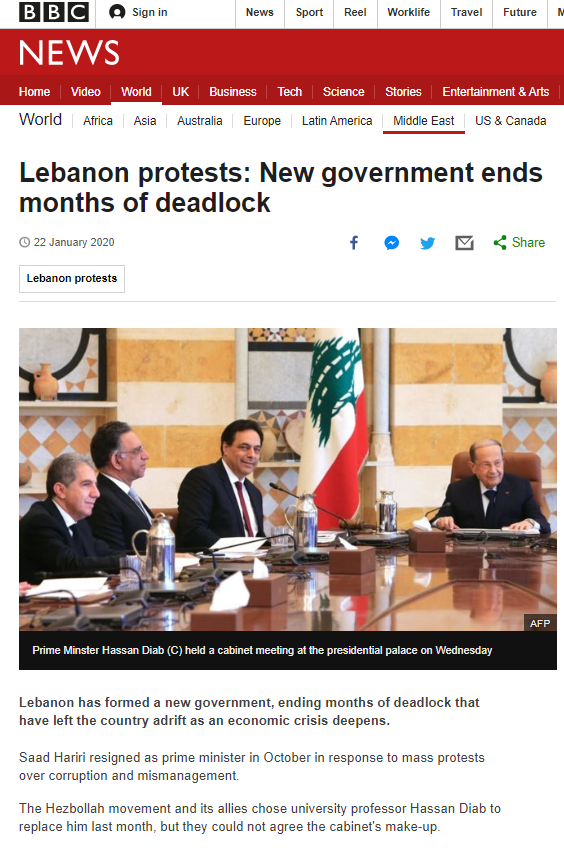
“Saad Hariri resigned as prime minister in October in response to mass protests over corruption and mismanagement.
The Hezbollah movement and its allies chose university professor Hassan Diab to replace him last month, but they could not agree the cabinet’s make-up. […]
Mr Diab’s candidacy was backed by the biggest Shia Muslim factions, Hezbollah and Amal, and President Michel Aoun’s Christian Free Patriotic Movement.
Mr Hariri’s Sunni-led Future Movement, the Christian Lebanese Forces party and the Progressive Socialist Party of Druze leader Walid Jumblatt decided not to participate in the new government.
After more than a month of negotiations over portfolios, Mr Diab announced on Tuesday night a cabinet of 20 ministers who he insisted had no political loyalties. […]
“The cabinet is composed primarily of advisers and appointees representing the main political oligarchs and parties allied with Hezbollah,” wrote Paul Salem, president of the Middle East Institute.”
As we see the BBC understands perfectly well that the new government in Lebanon is, as its quoted analyst wrote, “politically aligned with the pro-Hezbollah and pro-Syrian axis in Lebanon”. One must therefore ask why it wastes public resources by having BBC Monitoring produce a video which completely ignores that elephant in the room and why the written report which does acknowledge Hizballah’s influence over the new government fails to make any mention of the obviously relevant fact that it is an internationally designated terrorist organisation.

